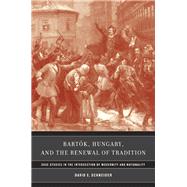Bartok, Hungary, and the Renewal of Tradition
, by Schneider, David E.- ISBN: 9780520245037 | 0520245032
- Cover: Hardcover
- Copyright: 11/1/2006
It is well known that Beacute;la Bartoacute;k had an extraordinary ability to synthesize Western art music with the folk music of Eastern Europe. What this rich and beautifully written study makes clear is that, contrary to much prevailing thought about the great twentieth-century Hungarian composer, Bartoacute;k was also strongly influenced by the art-music traditions of his native country. Drawing from a wide array of material including contemporary reviews and little known Hungarian documents, David Schneider presents a new approach to Bartoacute;k that acknowledges the composer's debt to a variety of Hungarian music traditions as well as to influential contemporaries such as Igor Stravinsky. Putting representative works from each decade beginning with Bartoacute;k's graduation from the Music Academy in 1903 until his departure for the United States in 1940 under critical lens, Schneider reads the composer's artistic output as both a continuation and a profound transformation of the very national tradition he repeatedly rejected in public. By clarifying why Bartoacute;k felt compelled to obscure his ties to the past and by illuminating what that past actually was, Schneider dispels myths about Bartoacute;k's relationship to nineteenth-century traditions and at the same time provides a new perspective on the relationship between nationalism and modernism in early-twentieth century music.







